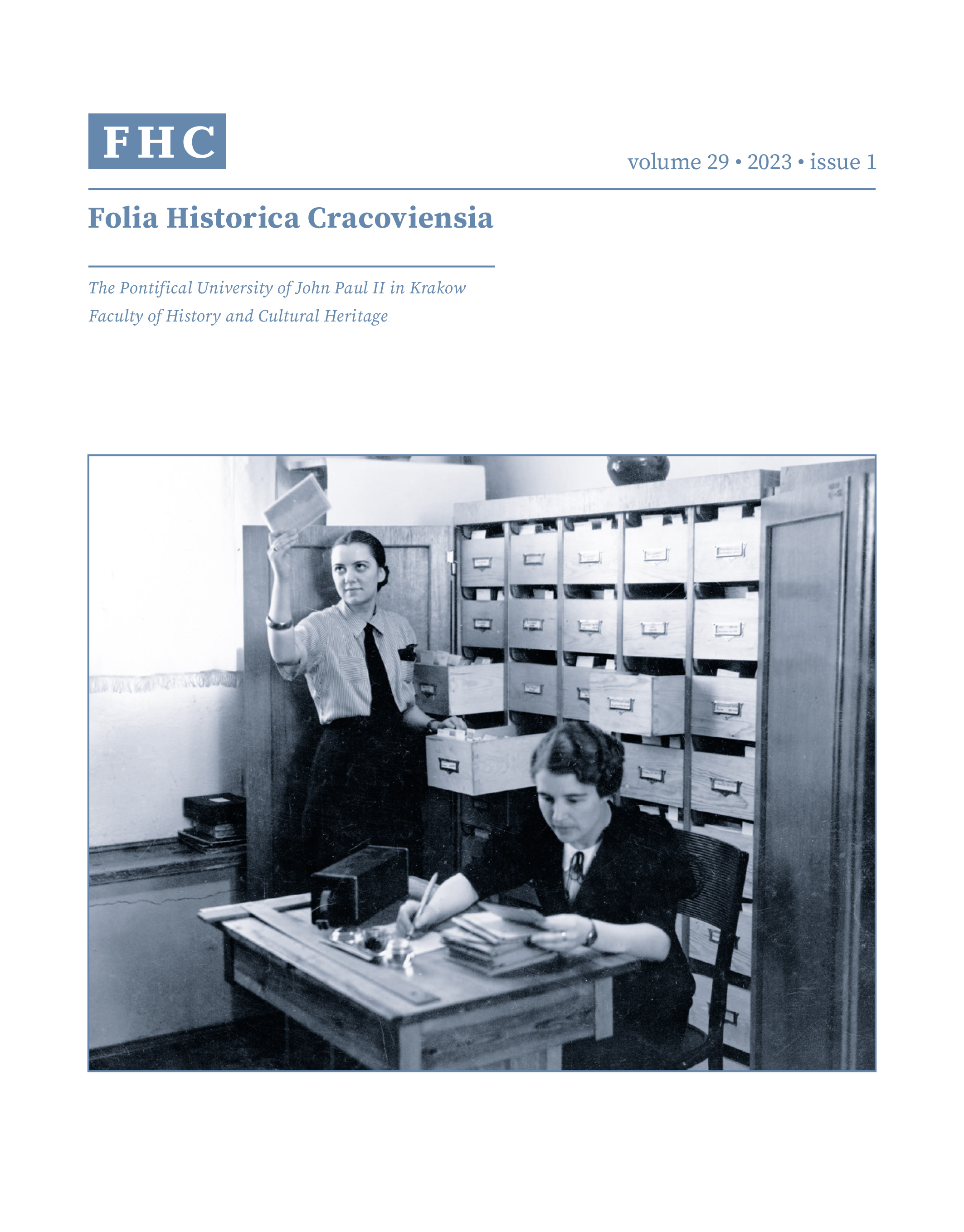Files of the Polish Welfare Committee Kraków–Miasto as a source for studying women’s history in 1939–1945
DOI:
https://doi.org/10.15633/fhc.29102Keywords:
German occupation, women’s history, charitable activities, everyday life, General GovernmentAbstract
Files of the Polish Welfare Committee Kraków–Miasto (Polish name: Polski Komitet Opiekuńczy Kraków-Miasto, acronym PolKO) are stored in the National Archives in Kraków and have been open to research for years. These files are a highly valuable source for researching the reality of life under occupation, and one of the archival collection whose potential is not being fully exploited by researchers. The purpose of this review is therefore an attempt to show the potential that the PolKO files contribute to the study of women’s history and its interdisciplinary potential. The Polish Welfare Committee Kraków–Miasto was a local branch of the Central Welfare Council (Rada Główna Opiekuńcza, RGO) that remained the only Polish welfare organisation in the General Government whose operation was permitted by the Germans. The records produced by the committee, albeit incomplete, reflect the main courses of activities these institutions undertook. Why can they useful as a source for researching women’s history? During the German occupation, official charitable activities became the domain of women. They were the majority among PolKO Kraków–Miasto personnel and cooperating individuals. The wartime circumstances also made women a majority among the committee’s beneficiaries. Analysing the PolKO records, you find information concerning both individual women’s motivation for embarking on charitable activity, the nature of work they performed, and the degree of involvement on the one hand, and reasons for poverty, and the types of support expected and delivered on the other.
References
Archives
National Archive in Kraków
— collection: Polski Komitet Opiekuńczy Kraków-Miasto
Central Archives of Modern Records (AAN)
— collection: Rada Główna Opiekuńcza. Biuro Centrali w Krakowie
Barbara Purtak Central Archive of Polish Nursing
— Virtual Museum of Polish Nursing, http://www.wmpp.org.pl/pl/pielegniarki-na-frontach/ii-wojna-%C5%9Bwiatowa/starowieyskamaria. html, Album Sekcji Charytatywnej Obywatelskiego Komitetu Pomocy w Krakowie, photo No. 2 (Aug 3, 2022).
Studies
Brandt A. M., Budowanie świadomości konsumenckiej w XX wieku, in: Dym. Powszechna historia palenia, eds. S. L. Gilman, Z. Xun, Kraków 2009, pp. 332–343.
Czocher A., Czy dobroczynność wymagała odwagi? O działaczach Polskiego Komitetu Opiekuńczego Kraków-Miasto 1939–1945, in: Cena odwagi. Między ocaleniem życia a ocaleniem człowieczeństwa, eds. A. Bartuś, P. Trojański, Oświęcim 2019, pp. 193–208.
Dufrat J., Stan badań nad dziejami kobiet w Polsce—I wojna światowa, okres międzywojenny, II wojna światowa, in: Dzieje kobiet w Polsce. Dyskusja wokół przyszłej syntezy, ed. by K. A. Makowski, Poznań 2014, s. 123–131.
Glasowitz M., Zwrot afektywny, “Opcje” (2013) No. 2, pp. 24–27.
Grądzka-Rejak M., Kobieta żydowska w okupowanym Krakowie (1939–1945), Kraków 2016.
Kałwa D., Historia kobiet—kilka uwag metodologicznych, in: Dzieje kobiet w Polsce. Dyskusja wokół przyszłej syntezy, ed. by K. A. Makowski, Poznań 2014, pp. 13–28.
Kałwa D., Przemoc i zapomnienie. Druga wojna światowa z perspektywy płci kulturowej, in: Kobiety i historia. Od niewidoczności do sprawczości, eds. K. Bałżewska, A. Korczyńska-Partyka, Wódkowska, Gdańsk 2015, pp. 27–43.
Klemensiewicz Z., Tytuły i nazwy zawodowe kobiet w świetle teorii i praktyki, in: Z. Klemensiewicz, Składnia, stylistyka, pedagogika językowa, ed. by A. Kałkowska, Warszawa 1982, pp. 729–753.
Kroll B., Rada Główna Opiekuńcza 1939–1945, Warszawa 1985.
Krysiak P., Feminatywa w polskiej tradycji leksykograficznej, “Rozprawy Komisji Językowej. Wrocławskie Towarzystwo Naukowe” 42 (2016), pp. 83–90.
Kultura afektu—afekty w kulturze. Humanistyka po zwrocie afektywnym, eds. R. Nycz, A. Łebkowska, A. Dauksza, Warszawa 2015.
Matoga H., W kręgu opiekuńczego czepka, Kraków 1999.
Ostrowska J., Przemilczane. Seksualna praca przymusowa w czasie II wojny światowej, Warszawa 2018.
Pamięć i afekty, eds. Z. Budrewicz, R. Sendyka, R. Nycz, Warszawa 2014.
Röger M., Wojenne związki. Polki i Niemcy podczas okupacji, Warszawa 2016.
Ronikier A., Pamiętniki 1939–1945, Kraków 2001.
Rosenwein B. H., Obawy o emocje w historii, “Teksty Drugie” (2015) No. 1, pp. 358–391 (originally published: Worrying about Emotions in History, “The American Historical Review” 107 (2002) Issue 3, pp. 821–845.
Świątecka M., Róża Łubieńska i jej działalność społeczna, “Nasza Przeszłość. Studia z dziejów Kościoła i kultury katolickiej w Polsce” (1979) No. 51, pp. 147–177.
Tabaszewska J., Między afektami i emocjami, “Przegląd Kulturoznawczy” (2018) No. 2, pp. 262–275, doi: 10.4467/20843860PK.18.017.9720.
Weh A., Prawo Generalnego Gubernatorstwa w układzie rzeczowym z objaśnieniami i szczegółowym skorowidzem, Krakau 1941.
Wenzel-Homecka Z., Polski Komitet Opiekuńczy Kraków-Miasto w latach 1939–1945 i jego akta, “Archeion. Czasopismo Naukowe Poświęcone Sprawom Archiwalnym” 41 (1964), pp. 325–345.
Wysmułek J., Przyrodzone, poskramiane czy konstruowane? Dyskursy o emocjach w badaniach historycznych, “Przegląd Humanistyczny” (2016) No. 2, pp. 81–96.
Downloads
Published
Issue
Section
License

This work is licensed under a Creative Commons Attribution 4.0 International License.
Authors who publish with this journal agree to the following terms:
- Authors retain the copyright and full publishing rights without restrictions, and grant the journal right of first publication with the work simultaneously licensed under a Creative Commons Attribution 4.0 International License that allows others to share the work with an acknowledgement of the work's authorship and initial publication in this journal.
- Authors are able to enter into separate, additional contractual arrangements for the non-exclusive distribution of the journal's published version of the work (e.g., post it to an institutional repository or publish it in a book), with an acknowledgement of its initial publication in this journal.
- Authors are permitted and encouraged to post their work online (e.g., in institutional repositories or on their website) prior to and during the submission process, as it can lead to productive exchanges, as well as earlier and greater citation of published work (See The Effect of Open Access).

